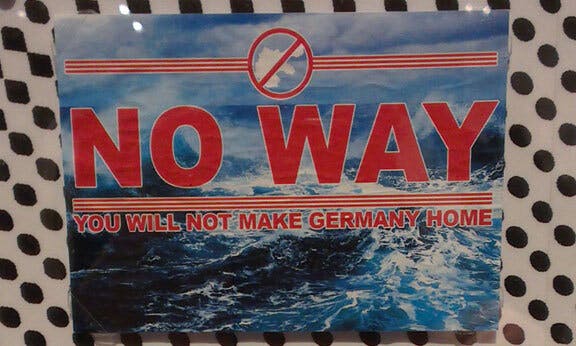Sanctions against Russia also target Germany

The US Senate on 14 June passed a new sanctions bill against Russia, supposedly as punishment for its “meddling” in last year’s presidential election. The vote was 98 to 2, indicating strong bipartisan support.
However, a key aspect of the bill reveals that Germany is the real target: it stipulates sanctions against a proposed new pipeline that would deliver natural gas to Germany under the Baltic Sea. An article in British magazine the Economist reported Germany’s reaction:
“‘Europe’s energy supply is Europe’s business, not that of the United States of America’, thundered Germany’s foreign minister, Sigmar Gabriel, and Austria’s chancellor, Christian Kern, in a joint statement. The pair were particularly incensed that the bill included a call to increase American exports of liquefied natural gas, implying that blocking Russian gas was partly an effort to help American energy companies. Angela Merkel, Germany’s chancellor, let it be known that she supported her minister.”
The pipeline is called Nord Stream 2. “NS2, which its backers hope will come online at the end of 2019, would supply gas directly from Russia’s Baltic coast to the German port of Greifswald, doubling the capacity of Nord Stream 1, an existing line”, the Economist explained. “Its defenders, including a consortium of five European firms that will cover half its cost of [$10.6 billion], say that it will help plug a projected gap between Europe’s stable demand for gas and declining production in the Netherlands and North Sea.
“Germany’s government, especially the Social Democratic Party (SPD), the junior coalition partner, shares this view. (Gerhard Schroeder, a former SPD chancellor of Germany, chairs NS2’s board).”
Much of Russia’s gas exports to Europe go through pipelines in Ukraine, which charges lucrative transit fees. The NS1 and 2 could bypass those pipelines, and deliver the gas more cheaply. It would also be cheaper than natural gas produced in the US, which has to be liquefied and shipped across the Atlantic.
The Economist added, “Some Germans quietly hope that NS2 could transform their country into a European energy hub” as a result. Washington seeks to prevent that development.
The House has yet to take up the Senate bill. The White House has urged House Republicans not to support a provision in the bill that would prevent the president from modifying it, but made no mention of the pipeline. Is the delay because of the strong German reaction?
The Economist article began by noting, “Like vinyl records and popped collars, rows between the United States and Europe over Russian energy are making a comeback. In the early 1980s Ronald Reagan’s attempts to thwart a Soviet pipeline that would bring Siberian gas to Europe irritated the West Germans and drove the French to proclaim the end of the transatlantic alliance. The cast of characters has shifted a little today, but many of the arguments are the same.”
The issue goes back further than Reagan. With the rise of modern German imperialism in the late 19th century, German policy toward Russia and Ukraine was summed up in the phrase “Drang nach Osten” – Drive to the East – to link up German industry with cheap Russian and Ukrainian raw materials and foodstuffs. The two world wars that the US fought against Germany were in part waged to stop such a development.
Since the Second World War, Germany has rebuilt. It now exports much more to the US than vice versa. The economic conflicts between the two countries that led to those wars are reappearing, due to Germany’s increasing industrial dynamism combined with the dramatic industrial decline in the US. Germany’s competitive position was further strengthened by the destruction of the nationalised, planned economy in East Germany a quarter of a century ago.
The return to capitalism in eastern Germany created mass unemployment. The German ruling class was able to use this reserve army in the reunified country to drive down wages, increasing Germany’s competitive position in the world. The German government feels strong enough to once again “drive to the east,” and the proposed pipeline is part of that.
German competition has become a point of contention in the US ruling class, reflected in the different approaches of Trump and the establishment.
Trump is saying that, to be economically competitive with Germany, powerful state countermeasures are required. He views Germany as the main enemy in Europe, and Russia as much less of a threat as far as industrial competition is concerned.
The establishment – which still dominates the media, the Pentagon, the CIA, Congress, the Democratic and Republican parties – thinks that economic friction with Germany can be worked out within the current world order, which has been dominated by the US since the last world war. But this world order has become increasingly shaky, as Foreign Affairs – the publication of the Council on Foreign Affairs, the ruling class’s foreign policy think tank – has emphasised in recent issues.
Trump and his economic nationalist advisors such as Steve Bannon are acting as if the old world order is collapsing and needs to be reordered along “America First” lines.
The establishment wants to keep Germany tied to the US and curtail its economy by preventing its drive to the east by imposing sanctions on both Russia and German firms seeking to build NS2, for example. Trump wants to ease sanctions on Russia and fight Germany directly. Perhaps the sanctions on the pipeline, a blow against Germany Trump supports, conflicts with Trump’s position to decrease sanctions on Russia, and he has yet to resolve the contradiction.
How all this will play out remains to be seen.